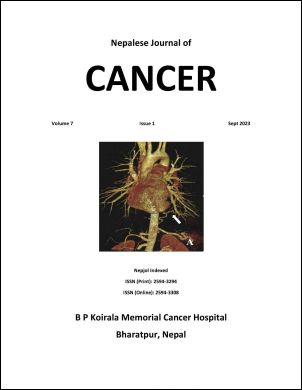Role of Neoadjuvant Chemotherapy on Advanced Epithelial Ovarian Cancer
DOI:
https://doi.org/10.3126/njc.v7i1.60282Keywords:
Advanced cancer of Ovary, Multimodal treatment, Interval debulding surgery, Neoadjuvant Chemotherapy.Abstract
Correspondence
Dr Manju Pandey , Gynecology Oncology Unit, Dept. of Surgical Oncology, BP Koirala Memorial Cancer Hospital, Bharatpur, Nepal. Email: drmanju921@gmail.com
Introduction: Ovarian cancer is the most lethal gynecological malignancy diagnosed at late stage in most of the cases. Management includes primary debulking surgery with a target of no gross residual disease or ≤ 1cm residual disease followed by paclitaxel and carboplatin-based chemotherapy. Neoadjuvant chemotherapy of at least 3 cycles followed by interval debulking surgery is an alternative option in selected cases of advanced disease. Material and Method: A prospective study was carried out at B.P. Koirala Memorial Cancer Hospital, Bharatpur, Chitwan from the period 1st November 2022 to 31st August 2023 (10 months). Patients diagnosed with advanced ovarian cancer based on clinical and CECT findings and confirmed with cytology or FNAC or biopsy undergoing Interval Debulking Surgery after 3 cycles of NACT (paclitaxel and carboplatin) were included. The role of NACT in terms of response according to RECIST criteria, regression of CA125 value, rate of complete or optimal cytoreduction, and postoperative complications were analyzed. Results: A total of 40 cases fulfilling the inclusion criteria were enrolled. Most patients 14(35%) were between 51-60 years with a mean age of 51.45 ± 11.46 SD years. Abdominal pain and/or distension were the most common presenting symptoms. The majority 32 (84.2%) of cases were given NACT based on CT scan findings of advanced disease. Confirmation of malignancy was done by positive USG-guided FNAC from ovarian mass in most cases 23 (57.5%), followed by positive ascitic fluid cytology in 8 (20%) patients. The median CA125 value before and after NACT were 844 U/ml and 27.89 U/ml respectively. After NACT, CA125 was normalized in 24 (60%) patients. Most patients 30 (75%) had complete cytoreduction during IDS; while 7 (17.5%) patients had optimal cytoreduction, and 3 (7.5%) had suboptimal cytoreduction. The median duration of surgery was 147.5 minutes, and the median blood loss was 287.5 ml. The postoperative period was uneventful in most cases. Conclusions: NACT followed by interval debulking surgery is an effective alternative in selected cases of advanced ovarian cancer as the complete and optimal cytoreduction rate is higher with fewer postoperative complications.
Downloads
Downloads
Published
How to Cite
Issue
Section
License
Copyright (c) 2023 Nepalese Journal of Cancer

This work is licensed under a Creative Commons Attribution 4.0 International License.
This license lets others distribute, remix, tweak, and build upon your work, even commercially, as long as NJC and the authors are acknowledged.
Submission of the manuscript means that the authors agree to assign exclusive copyright to NJC. The aim of NJC is to increase the visibility and ease of use of open access scientific and scholarly articles thereby promoting their increased usage and impact.




